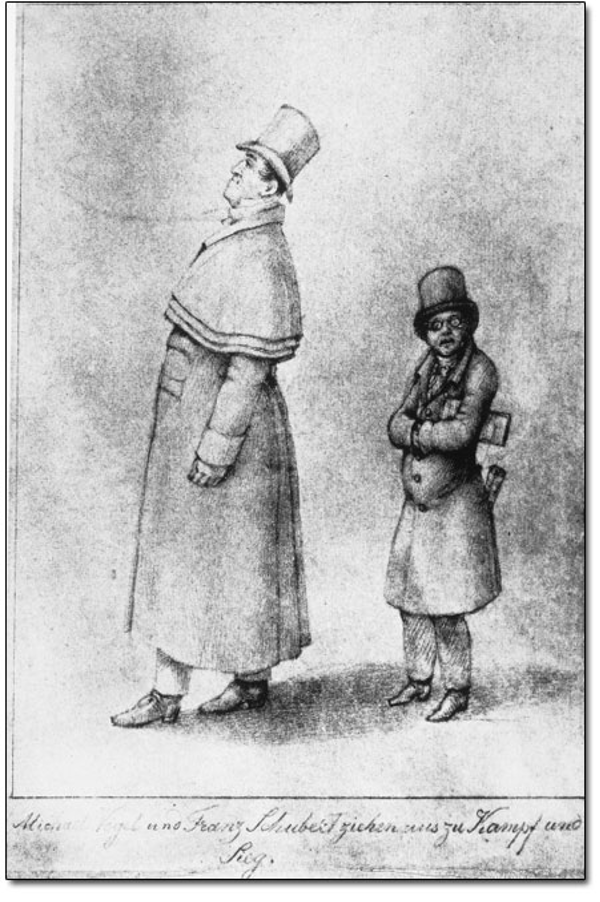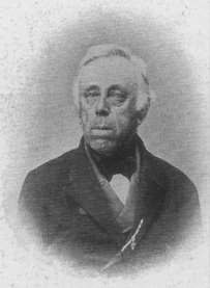Cantata for the birthday of the singer Johann Michael Vogl
(Poet's title: Kantate zum Geburtstag des Sängers Johann Michael Vogl)
Set by Schubert:
D 666
for Soprano, Tenor, Bass and piano[August 10, 1819]
Sänger, der von Herzen singet
Und das Wort zum Herzen bringet,
Bei den Tönen deiner Lieder
Fällt’s wie sanfter Regen nieder,
Den der Herr vom Himmel schickt
Und die dürre Flur erquickt.
Diese Berge sahn dich blühen,
Hier begann dein Herz zu glühen,
Für die Künstlerhön zu schlagen,
Die der Wahrheit Krone tragen.
Der Natur hast du entwandt,
Was die Kunst noch nicht verstand.
Da saht ihr Orestes scheiden,
Jakob mit der Last der Leiden,
Saht des Arztes Hoffnung tagen,
Menschlichkeit am Wasserwagen,
Saht, wie man sich Linen sucht,
Bräute holt aus Bergesschlucht.
In der Weihe deiner Würde
Stehst du, aller Sänger Zierde,
Auf Thaliens Tempelstufen,
Hörst um dich des Beifalls Rufen,
Doch ein Kranz, ein Sinngedicht,
Ist der Lohn des Künstlers nicht.
Wenn dich einst in greisen Tagen
Deines Lebens Mühen plagen,
Willst du nicht zur Heimat wandern?
Lass die Helden einem Andern,
Nur von Agamemnons Sohn
Trag die treue Brust davon.
Gott bewahr dein teures Leben,
Heiter, spiegelklar und eben,
Wie das Tönen deiner Kehle
Tief herauf aus voller Seele.
Schweigt dann einst des Sängers Wort,
Tönet doch die Seele fort.
Singer, you who sing from the heart
And who bring the word to the heart
With the notes of your songs,
It feels as if gentle rain is falling,
Sent from heaven by the Lord,
Bringing life to barren fields!
These mountains saw you blossom,
It is here that your heart began to glow,
To beat in time with your heights as an artist
Wearing the crown of truth;
You have wrested from nature
Something which art had not previously understood.
Over there you saw Orestes depart,
Jacob with his burden of sorrows,
You saw the doctor’s hope dawning,
Humanity by the water carriage;
You saw people looking for Lina,
Taking brides from gorges in the mountains.
Consecrated by your merits
You stand there, the adornment of all singers,
On the steps of Thalia’s temple.
Around you, you can hear storms of applause,
Yet no garland, no epigram,
Is sufficient reward for an artist.
If at some point days are grey
And you are troubled by the concerns of life,
Will you not travel to your homeland?
Leave the heroes to someone else,
From Agamemnon’s son just
Carry away the faithful breast.
God protect your dear life,
Joyful, clear as a mirror and smooth,
Like the notes that emerge from your throat,
Coming from the depths of a full soul;
Even if at some point the singer’s words fall silent
His soul will continue to ring out.
All translations into English that appear on this website, unless otherwise stated, are by Malcolm Wren. You are free to use them on condition that you acknowledge Malcolm Wren as the translator and schubertsong.uk as the source. Unless otherwise stated, the comments and essays that appear after the texts and translations are by Malcolm Wren and are © Copyright.
☙
Themes and images in this text:
Bards and minstrels Hearts High, low and deep Home (Heimat) Noise and silence Songs for special occasions Songs (general) Soul Temples
The 10th August 1819 was Johann Michael Vogl’s 51st birthday. The famous Vienna opera singer, as was habitual for him, had returned to his home town of Steyr for the summer holiday, but this year he went in the company of the much younger composer, Franz Schubert, whom he had first met two years previously. The opportunity was taken to arrange for this cantata to be performed in the great singer’s honour. Albert Stadler (a friend of Schubert’s in Vienna who had recently moved to Steyr to work as a civil servant) wrote the text and played the piano. The singers were Josefine von Koller (soprano), Bernhard Benedict (bass) and Schubert (tenor).
The opening of the text seems to quote the dedication on Beethoven’s Missa Solemnis, ‘Von Herzen – Möge es wieder – zu Herzen gehen’ (From the heart – may it go back – go back to the heart). However, since this work was not presented to its dedicatee until 1823, Stadler could not have known the phrase (unless, as Deutsch speculates, it was in common use at the time).
The second stanza welcomes Vogl back to his home town of Steyr and the surrounding region (‘these mountains’), where his artistic inclinations developed. The third strophe, in contrast, refers to Vogl’s great successes in Vienna (‘Da’ / There). Otto Erich Deutsch identified the works mentioned in this stanza in his Schubert. A Documentary Biography (English edition, London 1946 pp. 123 – 4):
- Orestes – Gluck, Iphigenia in Tauris
- Jakob – Méhul, Joseph
- the doctor (Berg) – Gyrowetz, Der Augenarzt (The Eye Specialist)
- the water-carrier (Micheli) – Cherubini, Der Wasserträger (Les Deux Journées)
- someone looking for Lina / Emeline (Jakob Friburg) – Weigl, Die Schweitzerfamilie (The Swiss Family)
Although Vogl was best known for his work in tragedy (as Orestes particularly), the fourth stanza declares that he is now standing at the Temple of Thalia (the muse of comedy), which is presumably intended to give the impression that he was able to encompass the full spectrum of his art (and to lighten the tone slightly on his birthday).
It was perhaps not so diplomatic to raise the question of Vogl’s possible future retirement (will he come back and live in Steyr?) or, even worse, his eventual silence in death. The pious conviction is expressed that his overflowing soul will continue to move us even after his voice can be heard no longer, but it is hard to believe that this would have been a particularly welcome birthday message. After all, it is generally accepted that Vogl took up the cause of Schubert and his songs partly as a way of putting off his own retirement. There is perhaps a hint of the singer’s less than whole hearted reaction to the cantata in Schubert’s letter to Mayrhofer of 19th August:
Have you done anything yet? I hope so. – Vogl’s birthday festivities we celebrated with a cantata written by Stadler and composed by me, which was quite a success. Now good-bye until the middle of September.
(Deutsch, Schubert. A Documentary Biography English edition, London 1946 p. 124)

drawing attributed to Franz von Schober
☙
Original Spelling Kantate zum Geburtstag des Sängers Johann Michael Vogl Sänger, der von Herzen singet Und das Wort zum Herzen bringet, Bei den Tönen deiner Lieder Fällt's wie sanfter Regen nieder, Den der Herr vom Himmel schickt, Und die dürre Flur erquickt! Diese Berge sah'n dich blühen, Hier begann dein Herz zu glühen, Für die Künstlerhöh'n zu schlagen, Die der Wahrheit Krone tragen; Der Natur hast du entwandt, Was die Kunst noch nicht verstand. Da saht ihr Oresten scheiden, Jakob mit der Last der Leiden, Saht des Arztes Hoffnung tagen, Menschlichkeit am Wasserwagen; Saht, wie man sich Linen sucht, Bräute holt aus Bergesschlucht. In der Weihe deiner Würde Stehst du, aller Sänger Zierde, Auf Thaliens Tempelstufen, Hörst um dich des Beifalls Rufen, Doch ein Kranz, ein Sinngedicht, Ist der Lohn des Künstlers nicht. Wenn dich einst in greisen Tagen Deines Lebens Mühen plagen, Willst du nicht zur Heimat wandern? Laß die Helden einem Andern, Nur von Agamemnons Sohn Trag die treue Brust davon. Gott bewahr' dein teures Leben, Heiter, spiegelklar und eben, Wie das Tönen deiner Kehle Tief herauf aus voller Seele; Schweigt dann einst des Sängers Wort, Tönet doch die Seele fort.
Note: Schubert received Stadler’s poem in manuscript. When Schubert’s cantata was posthumously printed by Diabelli, it was published with the title Der Frühlingsmorgen and a completely different text by an unknown author.


